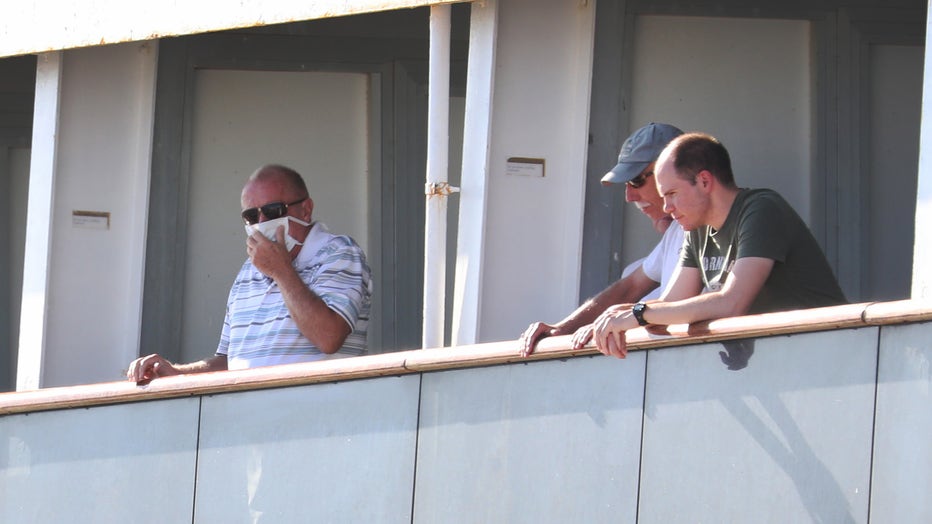CDC extends COVID-19 no-sail order as nearly 100 cruise ships remain at sea off US coasts
LOS ANGELES - As the COVID-19 death toll continues to rise, the U.S. Centers for Disease Control and Prevention has announced an extension of a no-sail order originally issued March 14 for all cruise ships.
“We are working with the cruise line industry to address the health and safety of crew at sea as well as communities surrounding U.S. cruise ship points of entry,” said CDC Director Robert Redfield in a statement.At the time of the initial order, cruise line operators had worked with local governments to help more than 250,000 passengers from over 120 vessels return home.
RELATED: CoronavirusNOW.com, FOX launches national hub for COVID-19 news and updates
Now, the CDC estimates that at least 10 cruise ships recently reported positive cases of coronavirus from crew and passengers, including the Disney Wonder, the Holland America Zaandam and the Celebrity Coral Princess. Approximately 100 cruise ships remained at sea off the East Coast, West Coast and Gulf Coast, with nearly 80,000 crew aboard all of the ships combined.
The CDC said the agency is also aware of 20 cruise ships at port or anchorage in the United States with known or suspected COVID-19 patients who are remaining isolated on board the vessels.
RELATED: Stay at home: These states have issued orders for residents not to go out amid COVID-19 pandemic
According to the CDC, the no sail order will remain in effect until “the earliest of three situations”:
- The expiration of the Secretary of Health and Human Services’ declaration that COVID-19 constitutes a public health emergency
- The CDC Director rescinds or modifies the order based on specific public health or other considerations
- Or 100 days from the date of publication in the Federal Register
“The measures we are taking today to stop the spread of COVID-19 are necessary to protect Americans, and we will continue to provide critical public health guidance to the industry to limit the impacts of COVID-19 on its workforce throughout the remainder of this pandemic,” added Redfield.
The news of the order’s extension came on the same day a crew member who was hospitalized for days after two ill-fated cruise ships with coronavirus patients were finally allowed to dock in Florida died, according to local officials.

FILE - Passengers stand aboard the Rotterdam cruise ship as it arrives at Port Everglades on April 02, 2020 in Fort Lauderdale, Florida.
Broward County Medical Examiner Craig Mallak on Thursday confirmed the death of Wiwit Widarto, 50, of Indonesia. Widarto had tested positive for COVID-19, raising the Holland America Zaandam’s coronavirus-related death toll to four.
The man died Wednesday, six days after the Zaandam and a sister ship docked in the Fort Lauderdale port after spending two weeks at sea rejected by South American ports, said Holland America Line spokesman Erik Elvejord. He had been taken to a Florida hospital the same day the ship docked.
Four elderly passengers had already died before the cruise ships arrived, and the medical examiner said earlier this week that three of those men tested positive for COVID-19. The fourth man's death was caused by a viral infection. Mallak said he tested negative for the new virus but had been dead for 12 days before he was examined.
RELATED: Can’t find hand sanitizer? The World Health Organization has a recipe to make your own
About 1,200 passengers disembarked the Zaandam and sister ship the Rotterdam, which was sent to replenish the first with supplies and crew members who were falling ill. The cruise company and federal and Florida officials negotiated for days before allowing disembarkation.
The Zaandam departed from Buenos Aires, Argentina, on March 7, a day before the U.S. State Department issued an advisory to avoid cruise travel and a week before most cruise lines halted their sailings.
The CDC said it is working with the Department of Homeland Security and the U.S. Coast Guard to “determine the most appropriate public health strategy to limit the impact of COVID-19 at cruise ship ports of entry in the United States.”
The Associated Press contributed to this report.


